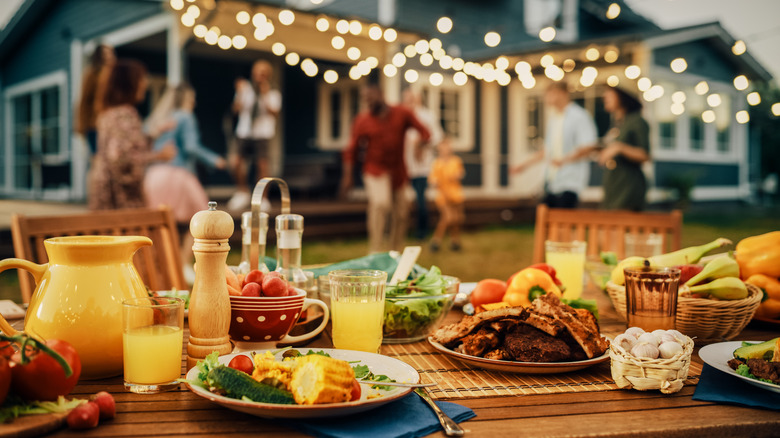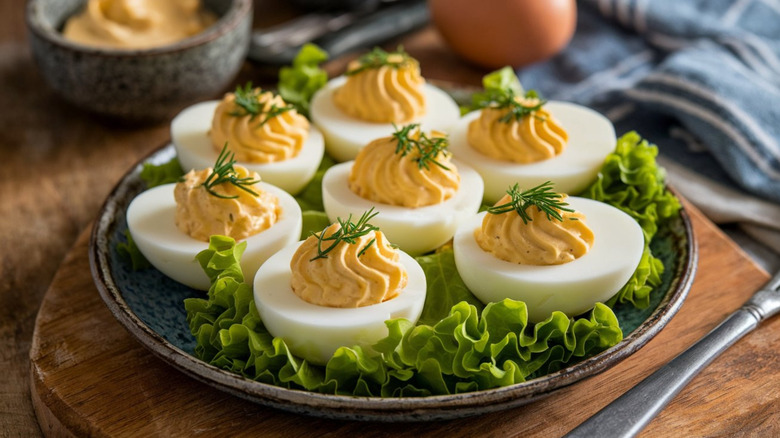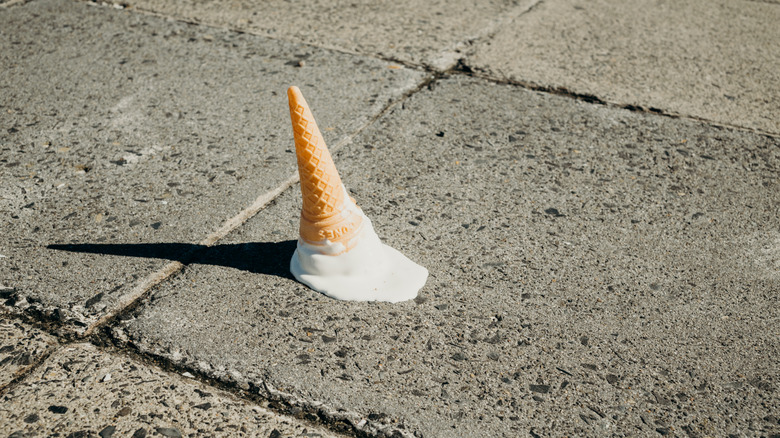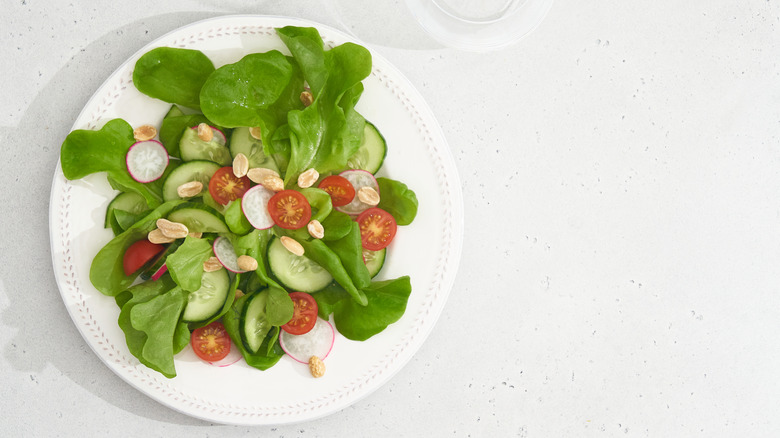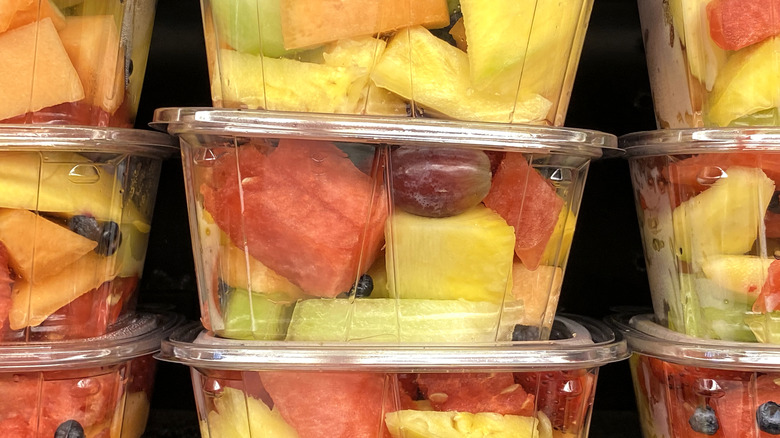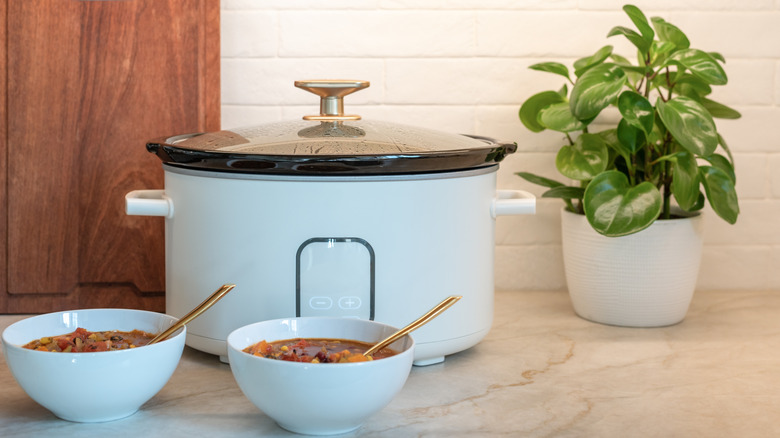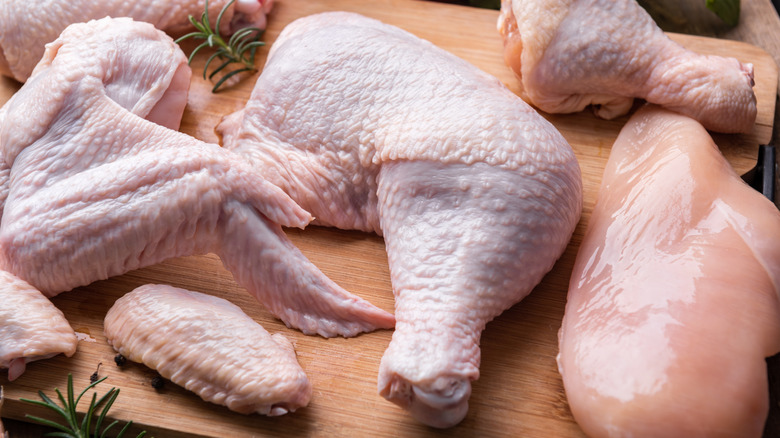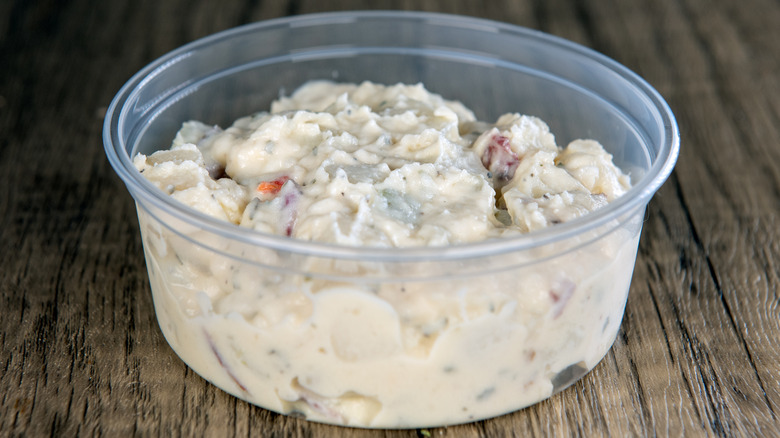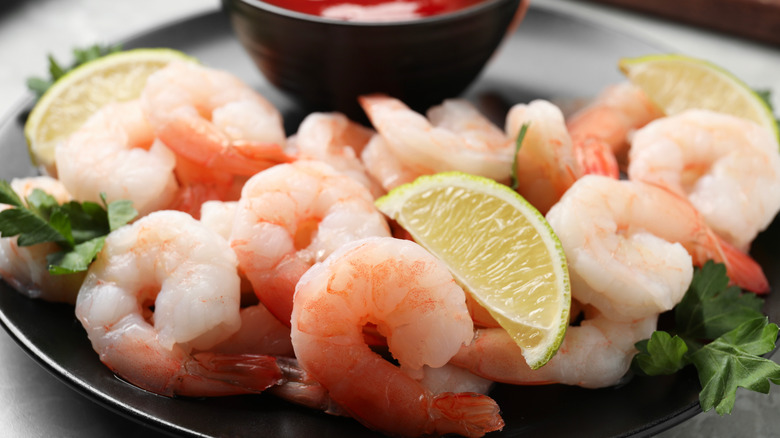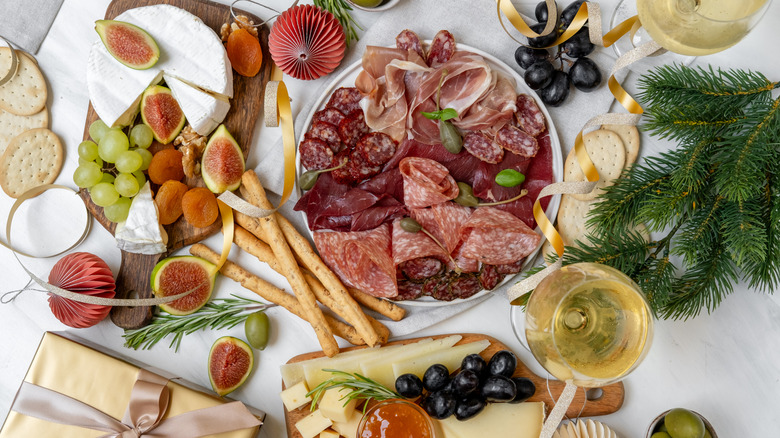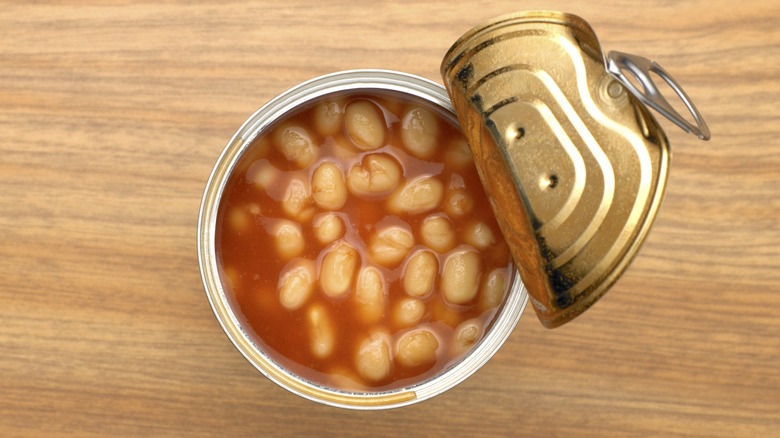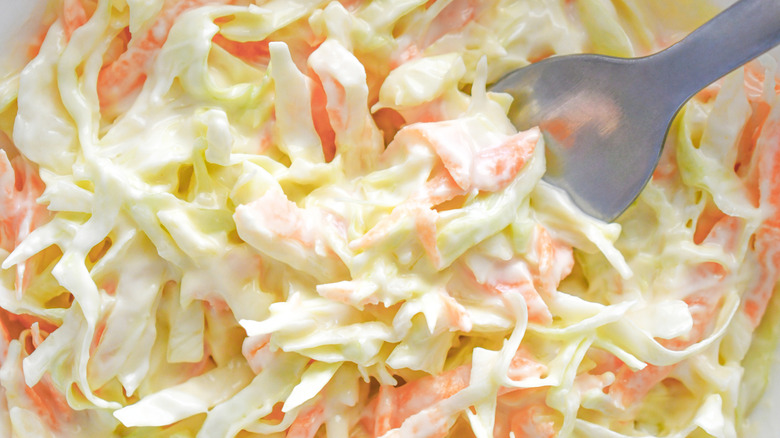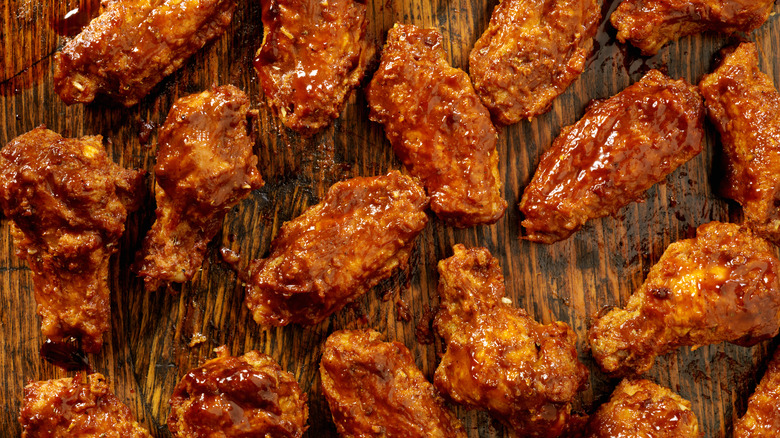Dishes No One Wants You Bringing To A Summer Cookout (But Won't Say It Out Loud)
Summer cookouts are sacred rituals of sun-soaked fun, sizzling grills, and a seemingly endless parade of burgers and beers. They're the perfect opportunity to bring friends and family together around a picnic table or a patch of lawn and share good times and even better food. But if you've ever been to a cookout, you know there's an unspoken truth lurking beneath all the laughter and backyard games: Not every dish is welcome. Some foods, no matter how well-intentioned, were just not meant for the specific vibe curated by a summer cookout.
There are dishes that people politely accept and nibble on out of obligation, and those are not the ones you want to be holding when you show up for some fun in the sun. We're diving into the foods that clash with the summer heat, the picnic vibe, and the practical realities of outdoor dining. From soggy salads to melting desserts and dishes that are just plain messy, these are the recipes that don't quite make the cut when the sun is blazing and the mosquitoes are circling. You won't hear people say it outright (manners and cookout diplomacy run deep), but trust me, your fellow guests will thank you if you skip these culinary landmines.
Deviled eggs
Deviled eggs might seem like a thoughtful nod to potlucks of yore, but don't be fooled. By the time you get to your summer cookout, deviled eggs are liable to turn into a sulfurous-smelling mess. The yolk filling goes from fluffy to sweaty, and whatever paprika or parsley garnish you tried to dress them up with probably won't survive the transportation to the cookout. The eggs' slippery undersides mean they slide around in the Tupperware, knocking around like bumper cars, and spilling all over the place. One speed bump and you've got the makings of a yolky massacre.
And unless you're bringing a dedicated cooler with perfect insulation (and ice packs you plan to swap out hourly), you're not keeping these bad boys in the safety zone. Eggs should not be left out for more than two hours, and in hot weather (above 85 degrees Fahrenheit), that drops to between thirty minutes and an hour. That's barely enough time for a round of corn hole! Even if you manage to serve them before they sweat themselves into mush, good luck convincing strangers to take the risk on a creamy egg in the sun.
Frozen desserts
A refreshingly chilly bowl of ice cream seems like a perfect idea on a hot summer day, but unless your cookout is happening inside a walk-in freezer, leave the frozen desserts at home. Your host is already juggling grill duty, playlist creation, and (if you're like me) social anxiety, and expecting them to bow to the needy temperature requirements of a frozen dessert is bad manners. The cooler and freezer are probably already full of beers, burger patties, hot dogs, and backup ice — so don't make your host play a game of frozen Tetris during the festivities.
Even if you manage to squeeze a pint of ice cream into the cooler, it'll start melting the moment you pop it open to grab a PBR. Before you know it, that fancy gelato will become a soupy mess you could drink through a straw. And not only that, but refreezing thawed ice cream can increase the risk of food-borne illness, turning your sweet tooth and good intentions into a listeria factory. If you feel the need to bring something sweet to a cookout, get a box of cookies or bake some brownies instead, for all our sakes.
Green salad
There's nothing wrong with salad. It's a crunchy, healthy way to get some fiber in your diet, and it makes you feel like a responsible adult. But a green salad has no place at a summer cookout. Given a bit of sunshine, dressed greens will wilt, turn translucent, and you'll end up with a wet pile of vegetal goo that tastes like old, damp paper towels. Even with a tightly sealed container and a separate dressing jar, you could be buying yourself no more than about 15 minutes of presentability.
Salad greens brown quickly in the best of circumstances, and in direct sunlight they wilt before you can say "salmonella." According to WebMD, salads are one of the most likely foods to give you food poisoning, and since hot, humid conditions are ideal for bacteria growth, those odds are even higher at a cookout.
That doesn't mean you can't enjoy veggies at a cookout. Bring roasted corn or grill some zucchini, but remember that cookout conditions are not ideal for the delicate greenery of a leafy salad.
Pre-cut fruit
Bringing pre-cut fruit to a cookout feels like a thoughtful, health-conscious move. You imagine yourself setting down a rainbow of melon cubes and strawberries, offering a beacon of refreshment among the ribs and chips. But in reality, you're serving up one of the most notorious bacteria traps in the entire grocery store.
Pre-cut fruit (especially melon) is a leading source of foodborne illness outbreaks, and has been behind produce recalls that affected millions of people. Cantaloupe, watermelon, and honeydew have all been linked to salmonella outbreaks, particularly when they're chopped, packed, and left to hang out at room temperature for too long. Once that plastic tub hits the picnic table, the clock is ticking.
Beyond safety concerns, the texture of pre-cut fruit in heat also leaves much to be desired. Melon turns mealy, berries collapse into mush, and everything starts leaking sugary juice into the bottom of the container. The mix becomes sticky, slippery, and deeply unappetizing, especially if bees and flies get involved, which they often do. If you're set on bringing fruit, bring it whole and cut it onsite. A whole watermelon is fresh, sturdy, simple, and infinitely more appealing when sliced fresh.
Anything in a slow cooker
I would only bring a slow cooker to a summer cookout if I had a secret vendetta against my host and I was trying to be passive aggressive. Slow cookers need electricity, and where do you think you're plugging that thing in? Are you running an extension cord through a cracked window like a soup-making raccoon?
Then there's the heat factor. It's 86 degrees Fahrenheit and humid, not exactly weather that calls for molten queso or hot buffalo dip. We are all doing our best not to sweat through our shorts, and you don't need to introduce a meaty mini sauna.
And on top of that, there's one common slow cooker mistake that can make your food unsafe to eat. Slow cookers can hold food in the "danger zone" if left unplugged or on the wrong setting. The USDA warns that perishable foods left between 90 and 140 degrees Fahrenheit for more than an hour are not to be trusted. Summer cookouts are for cold beers, charred meats, and food that doesn't require a power source. Leave the crock pot where it belongs: At home with your winter socks and unopened cans of pumpkin purée.
Raw chicken
Nobody wants to be responsible for your raw chicken at a cookout. Not the host, not the grillmaster, not the guests watching nervously as your marinated thighs sweat in a gallon Ziploc. Cookouts are a logistical balancing act, and the person on the grill is already juggling burgers, veggie skewers, and hot dogs. Adding raw poultry to the mix is just rude.
There are so many common mistakes people make with raw chicken, and this meat has no margin for error. Undercooked chicken is a stomach bug waiting to happen. If it's overcooked, it gets so dry you need to wash every bite down with a glass of water — it's like you've just gifted everyone a piece of drywall in teriyaki sauce. The CDC estimates that a million people get sick from poultry in the U.S. every year, mostly from improper handling and cooking of raw chicken.
Not to mention, transport is a nightmare. Chicken juice leaks, and it can cross-contaminate, seeping into fabric grocery bags and then mysteriously resurfacing later as a smell you can't quite locate. If you're hell-bent on bringing chicken, grill it at home, wrap it in foil, and let people eat it without fear.
Cupcakes
On Instagram, cupcakes at a cookout look adorable, artfully arranged in a spiral on a tiered stand with perfectly piped frosting. In reality, they are chaos. Frosting, no matter how stiff and pipeable at room temp, turns into sugary lava when it's exposed to summer sun. Even store-bought cupcakes, which seem like they could survive the apocalypse itself, start sweating before the grill even gets hot.
The result is a tray of sticky, smudged tops and greasy wrappers, dotted with the fingerprints of whoever made the mistake of trying to pick one up. You'll see people walking around holding cupcakes gingerly with two fingers, desperate to rid themselves of the messy confection and find a napkin. Before you know it, your sweet treat could be decorating someone's sundress.
Even if you do manage to keep them cool until dessert time, you're risking frosting on noses, crumbs in laps, and nowhere to wash your hands but an outdoor spigot. Save the cupcakes for a birthday party with central air.
Potato salad
If you really want to make it obvious that you're phoning it in, bring store-bought potato salad to a summer cookout. No matter the brand, store-bought potato salad always has that unmistakable stale refrigerator flavor, like it's been sitting in a grocery store cooler for days slowly marinating in its own mediocrity.
Even if you get a fresh batch from the deli counter, cooked potatoes are incredibly time-sensitive. Once they're cold and mixed with mayo, they begin a rapid decline into mushy, starchy blandness. The texture becomes grainy and the flavor is mostly mayonnaise, sometimes vinegar, and maybe a rogue chunk of celery. Too often, the mayo ratio is obscene, turning it into more of a paste than a salad. A scoop of it on your plate will slowly melt into a lukewarm puddle in the sun.
Plus, potato salad is famously easy to make. Boil some potatoes, and add mustard, mayo, pickles, or whatever crunchy veggie you have on hand. You can make it the night before with ingredients you already have in your kitchen. Bringing the store-bought stuff reeks of bad taste.
Shrimp cocktail
Bringing shrimp cocktail to a summer cookout is as bold as it is reckless. It may seem like a fun, fancy, photogenic retro appetizer, but in somebody's backyard in July, shrimp cocktail becomes an anxiety-inducing logistical nightmare.
Before you even arrive, you're hauling chilled seafood through 85 degrees Fahrenheit weather — hardly a romantic picture. If you don't have a cooler specifically dedicated to shrimp, you're probably wedging it next to cans of beer and hoping for the best. If you want it to look presentable at all, you'll either need to bring your own dishes or demand that your busy host help stroke your ego by providing a cut glass bowl.
Beyond that, there's something deep in my soul that recoils at the image of a sweaty ring of shrimp slowly curling in the heat, draped around a cup of warm cocktail sauce. The FDA warns that seafood should never be left out for more than an hour in temperatures above 90 degrees Fahrenheit. The best way to serve shrimp cocktail is in a controlled environment, preferably by the professionals at steakhouses and seafood restaurants. Leave it off the lawn!
Charcuterie board
A charcuterie board might be the crown jewel of your indoor dinner parties, but at a summer cookout, there's just no place for a plate of meat and cheese. Sure, it's a classy, elegant thought, but cookouts are about easy, heat-proof foods you can eat off a paper plate while holding a canned drink.
Even the hardiest cheddar will start sweating almost immediately, and the softer stuff like brie, goat cheese, and triple crème Camembert will melt into sticky, oozy blobs. Meanwhile, the meats begin their slow descent into visual and textural disaster. Once those cured slices hit the 90-degrees Fahrenheit mark, they get floppy, oily, and eventually take on a slightly gray hue that makes them deeply unappetizing.
And let's not forget that charcuterie begs for ceramic plates, cocktail napkins, and maybe a chilled rosé. Not plastic forks and a wobbly patio table shared with a bottle of ketchup and a bowl of tortilla chips. People don't want to stand around trying to spear a sweating cube of Manchego while swatting flies. So unless your cookout comes with personal refrigeration and a wine pairing, leave the charcuterie board at home.
Canned baked beans
Sure, baked beans are a classic side, but don't shame yourself by showing up to a summer cookout, cracking open a can, and dumping it into a plastic bowl. Most canned baked beans are overly sweet and smooth.
Many canned baked beans are also packed with sodium as well as added sugars. And good luck serving them on a paper plate! One spoonful creates a sloppy bean puddle that seeps into your burger bun and chases your coleslaw across the plate. People will have to start building potato salad levees to keep the beans from touching their chips.
If you bring baked beans, then make your own. Homemade husky rural baked beans are the way to go, loaded with smoky bacon, molasses, and maybe a splash of bourbon if you're feeling rowdy. They've got heft, character, and texture. You can slow-bake them in a Dutch oven until they caramelize into something that tastes like it was made with love and didn't come from a can.
Mayo-heavy coleslaw
A crunchy, cold, refreshing mouthful of coleslaw might be just what you need at a summer cookout, but the second you get heavy handed with the mayonnaise, you've turned a potentially bright, zippy side dish into a sad puddle of warm white goop. Mayonnaise begins to break down at high temperatures, turning runny and oily. Instead of binding your slaw ingredients, it starts to separate and pool at the bottom of the bowl. The cabbage gets soggy, the carrots go limp, and what was once meant to be a textural palate cleanser becomes a mouth-coating, overheated mush.
Slaw can be incredible when done right, and vinegar-based versions (like Carolina coleslaw) tend to hold up much better in the sun and can even taste better as they sit. But mayo-laden slaw at a summer cookout is a well-intentioned mistake that doesn't provide any fresh reprieve from the fatty ribs, burgers, and chips that usually make up a cookout menu.
Hot wings
I won't deny it: Hot wings are finger-licking, spicy, crowd-pleasing, and perfectly portable — but the moment you bring a tray of hot wings to a cookout, the problems start piling up. For starters, hot wings are best served fresh and piping hot. The magic is in the crispy skin and the fiery sauce coating every bite. But when wings cool down, they turn limp and greasy, losing all their appeal. That crispy, crunchy texture you crave morphs into a soggy, unappetizing mess.
Next, hot wings are a finger-food that demand careful handling, which doesn't mesh well with the dexterity required for a successful summer cookout. Sweat, dirt, and flies are all lurking, and guests are juggling drinks and plates. This means lots of sticky fingers, shared napkins, and stained clothes.
Lastly, the spicy sauces often contain dairy-based dips like ranch or blue cheese, which are highly perishable and need constant refrigeration. Let those sit out too long, and you risk foodborne illness.
